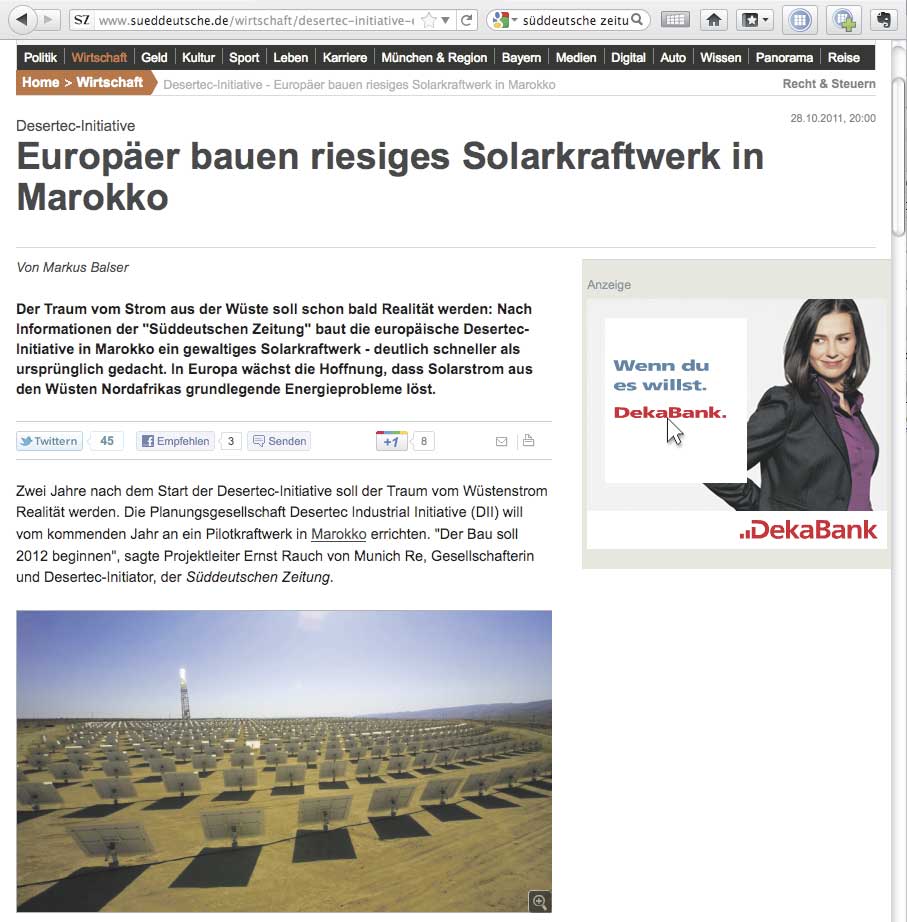Next year will see the construction of the first European solar power plant in Africa, reports the Süddeutsche Zeitung.
The 500-megawatt solar power tower is the first concrete step taken by the Desertec consortium – a German industrial alliance that aims to develop large-scale solar power installations in North-Africa, which will provide 15 percent of Europe’s power needs by 2050.
The total investment is estimated at 400 billion euros. The first step, a 500 MW solar plant in Morocco, cost 2 billion euros.
The Suddeutsche Zeitung bases its information on an interview it had with Ernst Reich, a project manager at Munich Re, one of the founders of Desertec. News about the intended construction is still missing from the official Desertec website, however.
“I think it’s very positive that they want to start next year,” says Professor Ad van Wijk (future energy systems, Applied Sciences faculty). “Projects as big as Desertec risk getting stuck in the planning stage. It’s always difficult to get it moving.”
“It’s a serious amount of power,” says Professor Lou van der Sluis (electrical power systems, Electrical Engineering, Mathematics and Computer Science faculty). “It equals the power of a unit in a coal-fired plant.”
Both professors agree on the technology used: concentrated solar power, which works by rows upon rows of rotating mirrors reflecting the sunlight onto a central ‘power’ tower, where the heat is stored and converted into pressurised steam that drives a turbine and a coupled generator. If a cloud temporarily blocks the sunlight, one would hardly notice it in the power output, adds Van der Sluis.
Van Wijk even thinks the solar plant might produce power at night. He explains that the solar heat is stored in the form of molten salt, and research literature states that a mixture of 60% sodium nitrate and 40% potassium nitrate has been used for this purpose. The hot molten salt generates steam for continuous power production, which has the additional advantage of making optimal use of the power cables connecting to the European grid.
Currently there is a 1400 MW alternating current cable running across the Strait of Gibraltar, which Prof. Van der Sluis confirms is mainly used for transporting power (900 MW on average) from Spain to Morocco. Desertec however prefers a HVDC connection (high voltage direct current). A 500 MW HVDC cable is comparable to the NorNed cable running between the Netherlands and Norway, Van der Sluis says.
Van Wijk believes the 2 billion euros budget will include a cable to Europe: “Currently, the standard for solar power is about 2 euros per Watt peak. So a 500 MW plant should cost 1 billion euros. I think the other half of the amount is for the cable and the converter stations.”
With Germany, France and Spain in the consortium, is there any room for Dutch participation? “We can of course invest,” says Van der Sluis, jokingly. “And the CEO, Paul van Son, is Dutch.”
Van Wijk: “Desertec is an industrial consortium of big firms like Siemens and RWE. The Netherlands no longer has any big electro-technical industries that could join in. The Dutch are better in offshore and wind energy. That’s what we should develop. In addition to the 15 percent solar power in 2050, there is plenty of need for other sustainable energy sources.” Van der Sluis adds: “Over the past ten years, Germany has invested in solar energy systems, while we just talked and held meetings.”
Bart van Zaalen, vijfdejaars student aan de faculteit Techniek, Bestuur en Management, geeft zijn eigen idealisme een 4. Naar eigen zeggen kan hij niet op alle gebieden idealistisch zijn. Hij vindt mensenrechten, dierenwelzijn en eerlijke wereldhandel belangrijk, maar geeft ook toe dat hij er niet zoveel mee bezig is. “Carrière, ontspanning en sport vind ik nu belangrijker.” Van Zaalen ziet zichzelf niet gauw werken voor een ideële organisatie. “Dat komt ook door mijn studierichting, transport. Ik denk dat ik eerder bij een grote transportorganisatie terecht kom.” De student koopt niet biologisch of Fair Trade en doet geen vrijwilligerswerk. Toch doet Van Zaalen niet helemaal niets op idealistisch vlak. Afgelopen weekend nog had hij een feestje waar een biertje een euro meer kostte. De opbrengst ging naar een goed doel. Als er een collectant aan de deur komt, wil de student ook nog wel eens zijn portemonnee trekken.



Comments are closed.